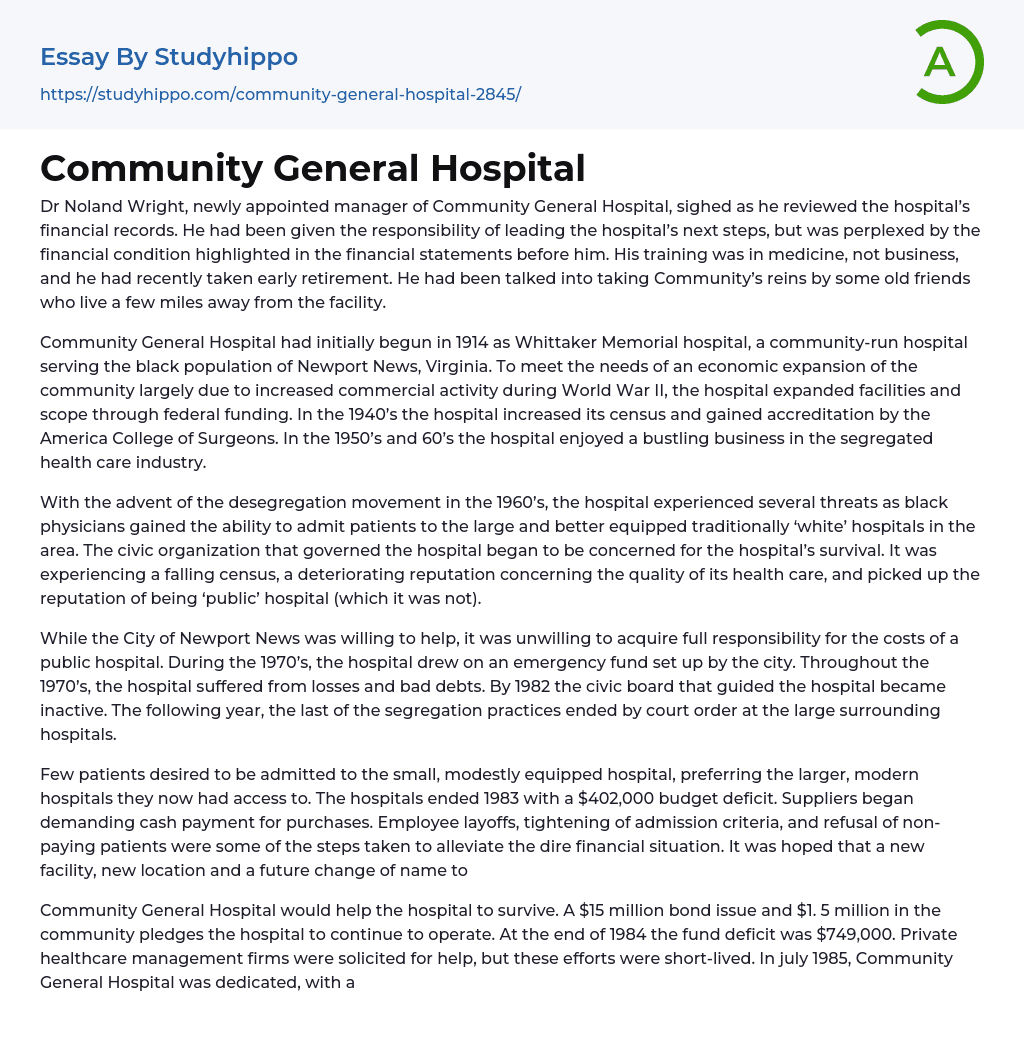Feeling overwhelmed while reviewing the hospital's financial records, Dr Noland Wright - the new manager of Community General Hospital - agreed to lead its future despite having a medical background instead of a business one. His decision was influenced by some nearby friends.
Established in 1914, Community General Hospital, also known as Whittaker Memorial hospital, was created to meet the healthcare needs of Newport News, Virginia's black community. During World War II, the hospital experienced growth and received financial assistance from the federal government in order to keep up with the increasing demands of its community. As the patient population grew during the 1940s, it obtained accreditation from the America College of Surgeons. Despite facing healthcare segregation in the 1950s and 60s, Community General Hospital continued to prosper.
In the 1960s, the hospital faced challenges due to desegre
...gation. The inclusion of black doctors in previously segregated hospitals led to a decline in patients and a tarnished reputation for healthcare excellence. Another issue was the misconception that the hospital was publicly owned, which it wasn't. Consequently, concerns arose within the governing civic organization regarding the hospital's future prospects.
Despite the City of Newport News being willing to assist, it was not prepared to fully bear the expenses of a public hospital. In the 1970s, the hospital relied on a fund established by the city for emergencies. However, throughout that decade, the hospital faced losses and unpaid debts. In 1982, the board overseeing the hospital ceased its operations. The subsequent year saw the termination of segregation practices at the neighboring major hospitals as mandated by a court order.
The small hospital faced a decline in admissions due to patients' preference fo
larger, modern hospitals. By the end of 1983, it had accumulated a budget deficit of $402,000. Suppliers began demanding cash payments. To address the dire financial situation, the hospital initiated cost-cutting measures including employee layoffs and stricter admission criteria. Additionally, non-paying patients were no longer accepted. The hospital also anticipated that relocating to a new facility and rebranding would contribute to its improvement.
Community General Hospital was able to preserve its existence with the assistance of a $15 million bond issue and $1.5 million in community pledges. Despite facing a fund deficit of $749,000 by the end of 1984, the hospital sought aid from private healthcare management firms, although these efforts were temporary. In July 1985, Community General Hospital successfully underwent dedication, featuring a novel infrastructure, modern equipment, and an increased occupancy rate. Throughout the period from 1979 to 1985, the hospital witnessed the leadership of seven distinct administrators.
The hospital faced ongoing losses and challenges in retaining management after 1985, which led its supporters to seek a solution for the persistent problems. Political channels were attempted and had some success but were not sustainable. The possibility of selling the hospital to a group of doctors for investment was considered, but ultimately rejected by the hospital’s supporters. By 1990, the hospital had accumulated a debt surpassing $20 million. The supporters’ board agreed to declare bankruptcy while the hospital continued to operate, with the board actively seeking affiliations with other nearby hospitals.
Despite efforts to improve the hospital's quality ratings, they continued to decline. In 1993, the hospital filed for bankruptcy and received approval for their petition. HUD settled for $4 million, providing temporary relief for creditors. Attempts
were made to find political solutions for the future of Community General, but unfortunately, they did not improve the hospital's situation. Administrators were appointed, but their time in office was brief. By mid-1996, the hospital faced a significant deficit and was desperately searching for guidance in what seemed like an impossible predicament.
- Readmission essays
- Bankruptcy essays
- Earnings essays
- Premise essays
- S corporation essays
- Secretary essays
- Tata Group essays
- Caste System essays
- Citizenship essays
- Civil Society essays
- Community essays
- Culture essays
- Deviance essays
- Discourse Community essays
- Female essays
- Filipino People essays
- Igbo People essays
- Indigenous Australians essays
- Indigenous Peoples essays
- Men essays
- Middle Class essays
- Minority Group essays
- Modern Society essays
- Popularity essays
- Social Control essays
- Social Institution essays
- Social Justice essays
- Social Norms essays
- Social Responsibility essays
- Socialization essays
- The nation essays
- Health Care Provider essays
- Hospital essays
- Physician essays
- Universal Health Care essays




